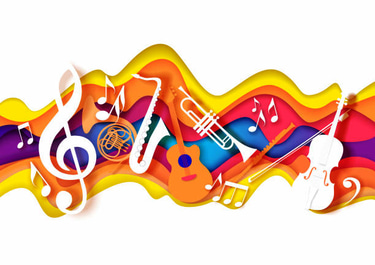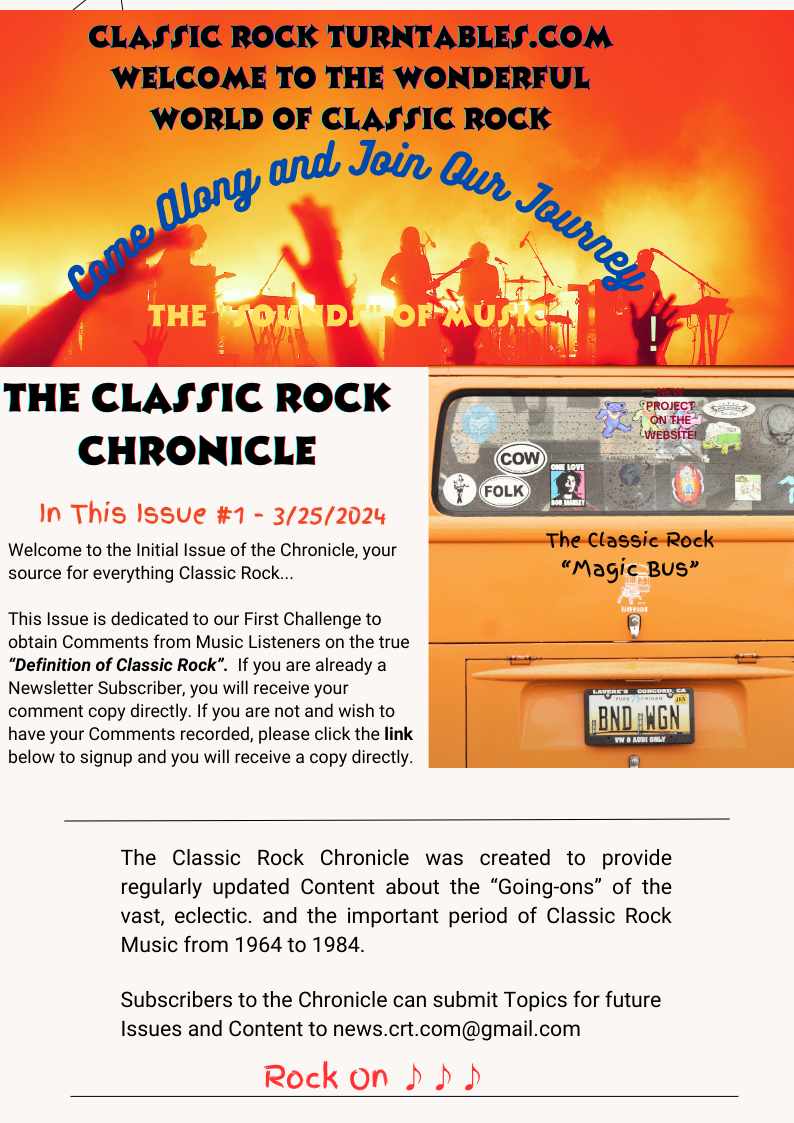

I want to thank all those who sent in their comments and we are on our way! I want to thank our Friends at Night Waves Radio in Liverpool, especially Eric Baxendale and his Team for their insight. For those of you who want to get your Voice heard for the last time, and are not a Newsletter subscriber yet, please sign up and you will receive a personal copy to mark up.
I am introducing my 12-part series on the Eagle's life in Music... After the early years, I will give my take on a year-by-year review and Stats with live videos of each major Concert.
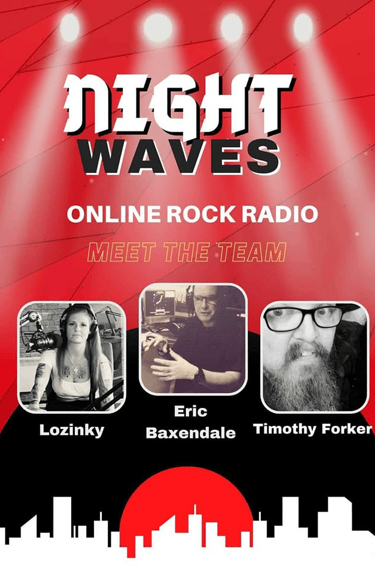

The Classic Rock Chronicle
I Issue #2 April 1, 2024
Everything Classic Rock... the CRocker's Voice
Issue #3 - The "Definition of Classic Rock" Final Draft
Issue #4 - Willie's Top 10 Classic Rock Songs (Personal)
Issue #5 - Willie's Top Classic Rock Bands (Personal)
It is no secret that the real, Willie Nelson is my Music Idol and I have followed him since 1962 after I found out that he wrote "Crazy" for Patsy... I saw him in Austin in 1972 and it was all she wrote for me (and as I grew up on a Farm, Country is in my blood, but when he started to play Country Rock, well, I can only say "WOW!)... I am posting this because the Eagles were a Country Rock band once... enjoy Willie's Fame.
PS - Willie's 91st Birthday is on April 29... oorah Willie... cannot wait for the next one...
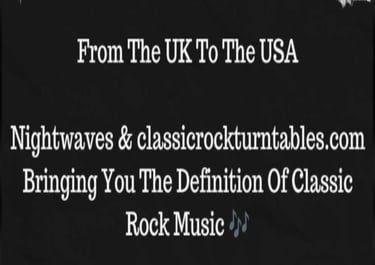


Each week we will search for interesting stuff to chew on... you may submit Content to stuff@classicrockturntables.com
Today is a Tribute to the Eagles and Glen Frey
The Eagle... A 12 part Series of their Life and Impact on Classic Rock
Preface (Source)
Rock Royalty: The Eagles’ Timeless Anthems Carve Their Legacy in Music History
When it comes to rock music, few bands have achieved the level of success and influence as The Eagles. With their unique blend of rock, country, and folk, the band created a sound that resonated with millions of fans around the world. Their timeless anthems continue to captivate audiences, carving their legacy in music history.
Formed in Los Angeles in 1971, The Eagles consisted of Glenn Frey, Don Henley, Bernie Leadon, and Randy Meisner. Their harmonies were unmatched, and their songwriting prowess was undeniable. From the moment they burst onto the scene, it was clear that The Eagles were destined for greatness.
Their self-titled debut album, released in 1972, introduced the world to their signature sound. Songs like “Take It Easy” and “Witchy Woman” showcased their ability to seamlessly blend rock and country elements. The album was an instant success, reaching the top 20 on the Billboard 200 chart and setting the stage for what was to come.
It was their 1976 album, “Hotel California,” that solidified The Eagles’ status as rock legends. The title track, with its haunting guitar solos and cryptic lyrics, became an instant classic. It remains one of the most recognizable and beloved songs in rock history. The album also featured hits like “New Kid in Town” and “Life in the Fast Lane,” further cementing their place in the annals of music.
The Eagles’ ability to craft heartfelt ballads was evident in songs like “Desperado” and “Lyin’ Eyes.” These emotionally charged tracks showcased their storytelling abilities and resonated with listeners on a deep level.
Their lyrics explored themes of love, loss, and the complexities of life, making their music relatable to people from all walks of life.
Despite their success, The Eagles faced internal conflicts and lineup changes over the years. However, their talent and dedication to their craft never wavered. They continued to release hit albums like “The Long Run” in 1979 and “Hell Freezes Over” in 1994, proving that their music was timeless and enduring.
In 2016, tragedy struck when Glenn Frey passed away, leaving a void in the band and in the hearts of fans worldwide. However, The Eagles decided to carry on, enlisting Frey’s son, Deacon, and country music star Vince Gill to join the lineup. Their resilience and commitment to honoring Frey’s legacy have been commendable.
The Eagles’ impact on music cannot be overstated. They have sold over 150 million records worldwide, making them one of the best-selling bands of all time. Their influence can be heard in countless artists who have followed in their footsteps, from country-rock acts like Zac Brown Band to modern-day rockers like Kings of Leon.
Their induction into the Rock and Roll Hall of Fame in 1998 was a testament to their lasting impact on the music industry. The Eagles’ music continues to resonate with new generations of listeners, proving that their anthems are truly timeless.
As we reflect on the legacy of The Eagles, it is clear that their music will forever hold a special place in the hearts of fans around the world. Their ability to blend genres, write captivating lyrics, and create unforgettable melodies is what sets them apart as true rock royalty. The Eagles’ timeless anthems have carved their legacy in music history, ensuring that their influence will be felt for generations to come.
************
Willie’s Take: Well, fortunate for me, I got to attend the Denver Pop Music Festival at Mile High in July, 1969… right before Woodstock (this was a little more organized)… I. frankly, was blown away. I got to be backstage working with the Sound Crew where I was introduced to Poco, and Southern California’s Country Rock scene in the early '70s. I needed to understand this and started to follow them and one Kenny Rogers to LA.
The Eagles were all veterans of various groups when they came to LA in the early '70s at the behest of Kenny Rogers… where they were introduced to Linda Ronstadt. After playing backup for a while, Henley, Frey, and Leadon performed together for the first time, backing Her at the first of a week of shows at Disneyland in Anaheim, California. It was also her 25th birthday on July 15, 1971.
I over heard the Eagles readying for “Take it Easy” before it started… I was taken back by their professionalism and collaboration. Anyway, Take it Easy is my personal all time favorite Classic Rock Song… if you subtract the Girl aspects and think about the message of the Tale, it fits my business career perfectly and every night before I rest my type A+.
Why is it my #1 Classic Rock Song?... well, he lyrics convey a message of not getting too caught up in one's own thoughts and anxieties, and instead finding a place to "make your stand and take it easy". The narrator is struggling with his own neurotic tendencies when it comes to love, but is trying to remind himself to stay grounded and not over think things. In 1975 to 1977, I traveled the US speaking with Universities about the upcoming “Electronics Revolution” that was a speeding Train… you need to think about your curriculum for business and technology courses. It wasn’t 7 that were on my mind, it was 12!
Regardless, everyone has their favorite Top 10s Songs and mine includes 2 Eagles classics, “Take it Easy” and “Hotel California”… the rest of their Top 10 is in my Top 40. So what makes the Eagles a solid, straight down-the-road Classic Rock Band?
The Eagles Sounds blended elements of traditional Rock, Country Rock (the California Sound) and Folk Rock… their early Albums Tracks were more of a “stripped-down”, traditional American Rock Sound that had a more “minimalist”, back-to-basics approach to their instrumentation and themes. With the addition of Joe Walsh, their Tracks incorporated Country Rock Fusion that put on a more polished Sound.
Their basic focus is on acoustic Guitars, dynamic Bass, and clear vocal harmonies, without excessive Production or Layering, allowing the Core of the Song to shine… their Instrumentation has a raw, organic Sound, and avoids excessive Studio polished Sounds or excessively refined (Natural).
Their Storytelling narratives explore Themes of relationships, personal struggles, and Human experiences… many Songs feature introspective, reflective Lyrics that delve into the complexities of the evolving California experiences. (relating to the “Cowboy” lifestyle of the American West). Their exceptional songwriting demonstrates a high level of craftsmanship and attention to the details of the Narrator using clever wordplay, metaphors, and poetic actions. Interestingly, many Songs are interpreted differently by Listeners (like mine on “Take it Easy”) to their personal experiences.
In summary, the Eagle's Legacy is defined by
Their Commercial and Critical Success… 200 million (100 US) sold worldwide showing their International prescience. Their “Greatest Hits 1971-1976 is the best-selling Album of all time (38x Platinum)… “Hotel California” is 3rd all time (26x)… 6 Grammy’s… Rock and Roll Hall of Fame (1998)… Kennedy Center Honors 2016
Their longevity, despite a period of hiatus, is true of those regarded as the most famous of Classic Rock bands… they were Pioneers in the blending of Country, Folk, and Bluegrass with their “Rock Sounds” that helped define what we call Country Rock. Their influencers include: Kenny Rogers, Linda Ronstadt, Willie Nelson, Merle Haggard, and Glen Campbell… Don Henley has cited Ray Charles as his all-time favorite Singer and his Album “Modern Sounds” which blends Country and Soul.
My stated view (everybody gets theirs) is the Eagles are my personal favorite Classic Rock band… along with the Stones, CCR, Beatles, Pink Floyd, The Who, Lynyrd, and others. From the time I first heard them in 1971, I have listened to a Track of theirs 99% of every waking day because their clearly understood Tales, easy-listening Rock Sound, and toe-tapping experience is in my blood… Rock On ♪♪♪
************
I cover the following time Segments for the Eagles “Uncovered”
The early Years to 1971 (below)
1971 to 1975 before Joe Walsh
The peak years 1975 to July 31, 1980
After the release of the “Long Run”, they went Solo for 14 years
1094 – 2007… the album “Long Road Out of Eden” marled their return to their classic Country Style while experimenting with new Sounds.
2007 to Present… the sweet years of Concerts and harmony… what will happen after their 4th Goodbye Tour starting at MSG in September
will walk through every year covering the Highs and Lows and welcome comments from newsletter subscribers to refine my content… thank you in advance… Willie
Part I… The Eagles Early Years
Introduction
Rock Royalty: The Eagles’ Timeless Anthems Carve Their Legacy in Music History
When it comes to rock music, few bands have achieved the level of success and influence as The Eagles. With their unique blend of rock, country, and folk, the band created a sound that resonated with millions of fans around the world. Their timeless anthems continue to captivate audiences, carving their legacy in music history.
Formed in Los Angeles in 1971, The Eagles consisted of Glenn Frey, Don Henley, Bernie Leadon, and Randy Meisner. Their harmonies were unmatched, and their songwriting prowess was undeniable. From the moment they burst onto the scene, it was clear that The Eagles were destined for greatness.
Their self-titled debut album, released in 1972, introduced the world to their signature sound. Songs like “Take It Easy” and “Witchy Woman” showcased their ability to seamlessly blend rock and country elements. The album was an instant success, reaching the top 20 on the Billboard 200 chart and setting the stage for what was to come.
It was their 1976 album, “Hotel California,” that solidified The Eagles’ status as rock legends. The title track, with its haunting guitar solos and cryptic lyrics, became an instant classic. It remains one of the most recognizable and beloved songs in rock history. The album also featured hits like “New Kid in Town” and “Life in the Fast Lane,” further cementing their place in the annals of music.
The Eagles’ ability to craft heartfelt ballads was evident in songs like “Desperado” and “Lyin’ Eyes.” These emotionally charged tracks showcased their storytelling abilities and resonated with listeners on a deep level. Their lyrics explored themes of love, loss, and the complexities of life, making their music relatable to people from all walks of life.
Despite their success, The Eagles faced internal conflicts and lineup changes over the years. However, their talent and dedication to their craft never wavered. They continued to release hit albums like “The Long Run” in 1979 and “Hell Freezes Over” in 1994, proving that their music was timeless and enduring.
In 2016, tragedy struck when Glenn Frey passed away, leaving a void in the band and in the hearts of fans worldwide. However, The Eagles decided to carry on, enlisting Frey’s son, Deacon, and country music star Vince Gill to join the lineup. Their resilience and commitment to honoring Frey’s legacy have been commendable.
The Eagles’ impact on music cannot be overstated. They have sold over 150 million records worldwide, making them one of the best-selling bands of all time. Their influence can be heard in countless artists who have followed in their footsteps, from country-rock acts like Zac Brown Band to modern-day rockers like Kings of Leon.
Their induction into the Rock and Roll Hall of Fame in 1998 was a testament to their lasting impact on the music industry. The Eagles’ music continues to resonate with new generations of listeners, proving that their anthems are truly timeless.
As we reflect on the legacy of The Eagles, it is clear that their music will forever hold a special place in the hearts of fans around the world. Their ability to blend genres, write captivating lyrics, and create unforgettable melodies is what sets them apart as true rock royalty. The Eagles’ timeless anthems have carved their legacy in music history, ensuring that their influence will be felt for generations to come. (Source
The Band was formed by four Los Angeles-based musicians who had migrated to the West Coast to seek fame and fortune…
Singer/bassist Randy Meisner Born in Scottsbluff, Nebraska, in 1946, Meisner co-founded a band called the Dynamics (later the Drivin' Dynamics) in 1961, in which he served as lead singer and bassist. By late 1962, they'd made their first record, produced and released themselves, which included a rendition of Sam Cooke's "You Send Me," sung by Meisner.
In 1966, following three years in which the Dynamics saw their audiences and fandom grow steadily from Nebraska to Oklahoma and Texas, Meisner left the group to join another Midwestern band called the Soul Survivors, who later moved to Los Angeles and changed their name to the Poor -- their other members included Allen Kemp and Patrick Shanahan. They were a serious enough outfit to attract the attention of the Warner Bros. subsidiary Loma Records and also of the Decca label, both of which released several folk-rock-influenced sides by the Poor without success.
He moved to L.A. in 1964 as part of a band originally called the Soul Survivors (not to be confused with the East Coast-based Soul Survivors, who scored a Top Five hit with "Expressway to Your Heart" in 1967) and later renamed the Poor. He became a founding member of Poco in 1968 but left the band before the release of its debut album to join the Stone Canyon Band, the backup group for Rick Nelson.
Singer/guitarist/banjoist/mandolinist Bernie Leadon was born on July 19, 1947, in Minneapolis, Minnesota, Leadon appreciated Rock & Roll, but his true love lay in country music, as he began playing in a California bluegrass outfit in 1962, the Scottsville Squirrel Barkers. After relocating to Florida by the mid-'60s, in 1967,
Leadon arrived in L.A. in 1967 and joined the short-lived country-folk band Hearts and Flowers, appearing on their second and final recording, 1968's Of Horses, Kids and Forgotten Women, before forming a new group, Dillard & Clark. But once more, Leadon's tenure with the group would be fleeting, as he played on all of their 1968 debut, The Fantastic Expedition of Dillard & Clark, and only a few select tracks on their sophomore effort, 1969's Through the Morning, Through the Night.
He then formed the Flying Burrito Brothers with ex-Byrd, Gram Parsons. Bassist and high-harmony singer Randy Meisner had worked with Rick Nelson, James Taylor, and Poco.
Singer/drummer Don Henley Born on July 22, 1947, in Gilmer, Texas, Don and was raised in Linden, a small town in Cass County, Texas. His parents -- his WWII veteran Father ran an auto parts business, his mother taught -- instilled a love of music into him at an early age but despite having some piano lessons, He didn't take to playing music as a child.
Henley instead was drawn to football and he played into high school, when he suffered an injury that led him to switch over to the marching band. There, he picked up drums and he took to it quickly, next playing in a group called the Four Speeds with his guitarist friend Richard Bowden. Soon, the band switched its name to Shiloh and the group was a going concern throughout high school but Henley put his music career on the back burner once he attended college.
He spent a year at Stephen F. Austin University before transferring to North Texas State University, where he was an English literature major. Henley spent three semesters at North Texas State before returning home to Linden to attend to his ailing father and, while he was there, he began playing with Shiloh again. In 1968, Kenny Rogers… who was then riding high after the Top 10 success of 1967's "Just Dropped In (To See What Condition My Condition Was In)" and when Don caught a Shiloh show, he encouraged the band to head out to Los Angeles to take a shot at the big time
Glenn Frey, Guitarist, was a rocker from Detroit who headed to Los Angeles in 1967, where he befriended fellow musicians Jackson Browne and J.D. Souther. He served as a backup musician for Bob Seger before moving to L.A. in the summer of 1968. He formed the duo Longbranch Pennywhistle… the two musicians signed with Amos Records, which released their self-titled album in 1969. (see a Tribute to Glen Fry below)
The Eagles had their origin when Don and Glen met at the Troubadour in 1970… in early 1971 when Linda Ronstadt and her manager John Boylan recruited musicians Glenn Frey and Don Henley for her Band. Henley had moved to Los Angeles from Texas with his band Shiloh to record an album produced by Kenny Rogers,[7] and Frey had come from Michigan and formed Longbranch Pennywhistle.
After working together on Linda Ronstadt’s eponymous album they went off on their own, honing the repertoire of songs that would appear on their debut album, which was recorded in England in 1972 with producer Glyn Johns.
The two then met in 1970 at The Troubadour in Los Angeles and became acquainted through their mutual record label, (Amos Records) Randy Meisner, who had been working with Ricky Nelson's backing Band, the Stone Canyon Band, and Bernie Leadon, a veteran of the Flying Burrito Brothers, also later joined Ronstadt's group of performers for her summer tour promoting the Silk Purse album.
While on the tour with Ronstadt, Frey and Henley decided to form a band together and informed Ronstadt of their intention. Frey later credited Ronstadt with suggesting Leadon for the band, and arranging for Leadon to play for her so Frey and Henley could approach him about forming a band together. They also pitched the idea to Meisner and brought him on board.
These four played live together behind Ronstadt only once for a July concert at Disneyland,[6] but all four appeared on her self-titled album. It was later proposed that J. D. Souther should join the band, but Meisner objected. The four were signed in September 1971 to Asylum Records, the new label started by David Geffen, who was introduced to Frey by Jackson Browne.
Geffen bought out Frey's and Henley's contracts with Amos Records, and sent the four to Aspen, Colorado, to develop as a band. Having not settled on a band name yet, they performed their first show in October 1971 under the name of Teen King and the Emergencies at a club called The Gallery in Aspen.
The idea of naming the band "Eagles" came during a peyote and tequila-influenced group outing in the Mojave Desert. However, accounts of the origin of the name vary; Don Felder, who had yet to join the Eagles and was not at the desert, credited Leadon with originating the name when he recalled reading about the Hopis' reverence for the eagle, while Souther suggested that the idea came when Frey shouted out, "Eagles!" when they saw eagles flying above. Steve Martin, a friend of the band from their early days at The Troubadour, recounts in his autobiography that he suggested that they should be referred to as "the Eagles", but Frey insists that the group's name is simply "Eagles"
************
So goes Part #1 of their evolution… if you wish to read and comment on the rest, please signup for the Chronicle Newsletter and you will receive a personal copy… Willie
A Tribute to Glen Fry…
Frey was born on Nov. 6, 1948, in Detroit and was raised in nearby Royal Oak. He grew up on both the Motown sounds and the harder-edged rock of his hometown. He played in a succession of local bands in the city and first connected with Bob Seger when Frey’s band, the Mushrooms, convinced Seger to write a song for them. Frey can also be heard singing extremely loud backing vocals (particularly on the first chorus) on Seger’s first hit and Frey’s first recorded appearance, 1968’s “Ramblin’ Gamblin’ Man.”
But it wasn’t long before warmer climes called and Frey followed then-girlfriend Joan Silwin to Los Angeles. Her sister Alexandra was a member of Honey Ltd., a girl group associated with Nancy Sinatra producer Lee Hazelwood, and she introduced Frey to her friend John David Souther.
It was a portentous introduction. Before long the two were living as roommates in East L.A. with another aspiring songwriter named Jackson Browne. All three quickly became deeply involved in the burgeoning L.A. country-rock scene centered around the Troubadour nightclub that started with the Byrds, proliferated with Gram Parsons and the Flying Burrito Brothers and would, in softer form, dominate American airwaves for the bulk of the 1970s. But first. Frey and Souther would pay their dues as an unsuccessful duo, Longbranch Pennywhistle. The pair released a self-titled album on the short-lived indie Amos Records in 1969, but soon split up.
In 1971, fellow future country-rock superstar Linda Ronstadt was seeking a backing band and, on the advice of Souther, her boyfriend, hired Frey along with his friend, drummer Don Henley. On the night of their first show with Ronstadt, the ambitious and driven pair decided to form their own band and later recruited ex-Poco bassist Randy Meisner and former Burritos guitarist Bernie Leadon. The Eagles became one of the first artists signed to David Geffen’s then-new label, Asylum. The group was an instant success, riding on the back of its first single, “Take It Easy” — a song written almost entirely by Jackson Browne, with some lyrics added by Frey. (Source)
As a guitarist, vocalist, and songwriter, Frey was instrumental in writing many of the Eagles' biggest hits, including "Take It Easy", "Tequila Sunrise", "Lyin' Eyes", and "Heartache Tonight". He was known for his ability to craft catchy, melodic rock songs that blended country, folk, and pop influences.
Beyond his musical contributions, Frey was also seen as the leader and driving force behind the Eagles. He helped steer the band through lineup changes and creative tensions, particularly between himself and Henley. Frey's charismatic stage presence and love of California's rock 'n' roll lifestyle also became a key part of the Eagles' image.
After the Eagles broke up in 1980, Frey went on to have a successful solo career, scoring hits like "The Heat Is On" and "You Belong to the City". However, he remained closely associated with the Eagles and their legacy, reuniting with the band in the 1990s and continuing to tour with them until his death in 2016 at the age of 67.
Frey's passing was a major loss for the music world, as he was recognized as a pivotal figure in the development of the hugely popular and influential Eagles sound. His songwriting, vocals, and leadership helped make the Eagles one of the best-selling American bands of all time.
R.I.P. Glen…
Eagle Members Don Henley And Joe Walsh Emotionally Reacts To Randy Meisner's Death
April Fools Joke
Joe Walsh was known for his art of destruction. While touring with the Eagles in the mid-’70s, Walsh would bring his guitar AND his chainsaw to enlarge hotel rooms that were not up to his standards. To poke fun at the 5-foot-3 Eagles manager Irving Azoff, Walsh once utilized his chainsaw to shorten the furniture legs in Azoff’s hotel room so that they would be more suitable for his short stature. Azoff got his revenge by nailing all of Walsh’s hotel furniture to the ceiling.
In late August of 1964, The Beatles started their first official U.S. tour. The group began at Cow Palace in San Francisco and finished at the Paramount Theatre in New York. On August 28-29 The Beatles played at Forest Hills Stadium in New York and were befriended by Bob Dylan. The two parties were introduced by the writer Al Aronowitz at New York’s Delmonico Hotel.
After a brief chat with The Beatles, Bob Dylan asked John, Paul, Ringo, George, and Brian Epstein if they wanted to smoke a joint. Epstein looked apprehensive and said that the band hadn’t tried marijuana for years. Dylan was immediately surprised because he had been under the impression that they smoked weed because of the song I Want to Hold Your Hand. He mistook the lyrics “I can’t hide” with “I get high.”
The Beatles were never one to back down from a new experience and agreed. Lennon took the joint and passed it to Ringo whom he called his “royal taster.” Ringo smoked the entire thing, not knowing the tradition of sharing the joint between people. In response, Dylan rolled a joint for each of The Beatles and they smoked. During the event it was reported that Epstein said “I’m so high I’m on the ceiling. I’m up on the ceiling.” McCartney got more philosophical and asked Mal Evans to write down everything he was saying.
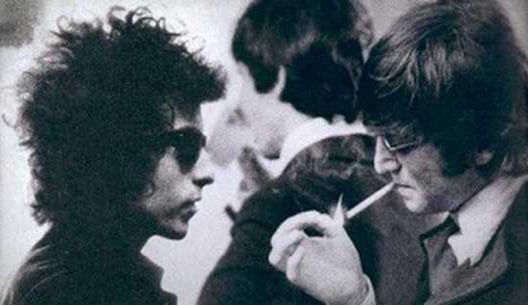

© ClassicRockTurntables.com
All Rights Reserved
